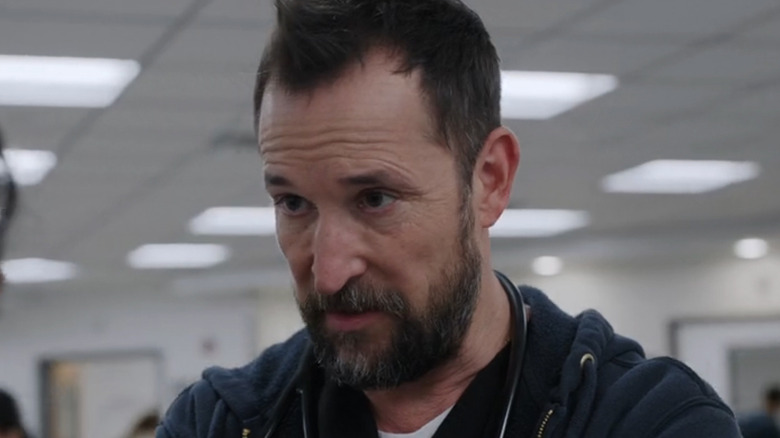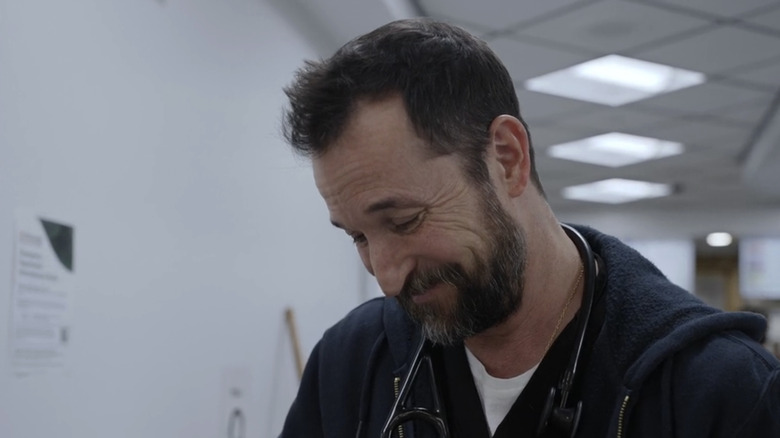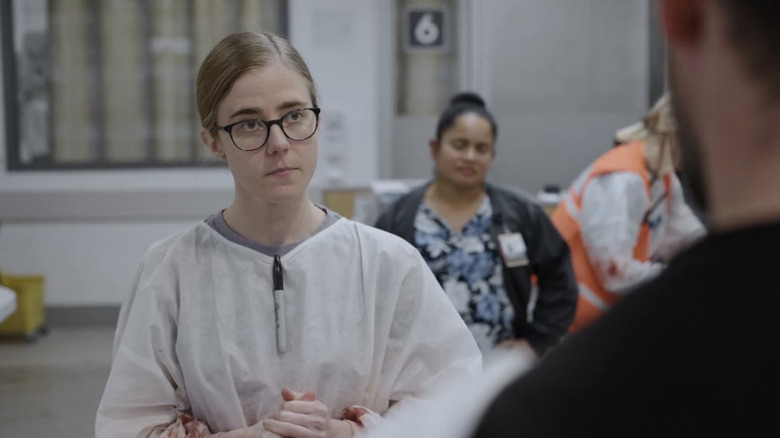The Pitt Showrunner Hopes The HBO Max Series Accomplishes One Thing
Before "The Pitt" debuted on HBO Max, Warner Bros. and the show's creators faced a lawsuit from Sherri Crichton, widow of "Jurassic Park" author Michael Crichton. The writer previously created "ER," which starred Noah Wyle as Dr. John Carter and was written and produced by R. Scott Gemmill alongside John Wells, who also served as its showrunner. These are the same men responsible for developing "The Pitt," and the Crichton estate wasn't exactly happy about them making what they saw as a blatant "ER" rip-off.
If you ask Wells, Wyle, and Gemmill, however, they had a very specific goal in mind with "The Pitt" — one which clearly separates the show from "ER." As Wyle told Variety, "Our intent with 'The Pitt' is to examine and contribute to the public discussion on the challenges facing emergency medical providers in the post-COVID world." In the series, we see this represented through Wyle's character, Dr. Michael Robinavitch or Dr. Robby. The senior attending physician at the fictional Pittsburgh Trauma Medical Center ER experienced the death of his mentor first-hand during the global pandemic and is still reeling from the experience throughout season 1 of "The Pitt."
But while this desire to showcase the effect that COVID had on doctors is central to "The Pitt," the show feels like it's about so much more than this. Sure, we see the slow breakdown of Dr. Robby, but it's propelled by a whole lot beyond the lingering memory of having to pull the plug on his mentor. Throughout season 1, which depicts a full 15-hour shift in the ER, Dr. Robby and his team are faced with myriad tragedies and traumas, all of which coalesce into a kind of ever-growing darkness looming over their day. By the end, then, we get a real sense of just how hard it is to be an ER doctor, regardless of the global pandemic. In a larger sense, the show appears to be making a point about how we can never truly know what kind of pressures people are facing or what they're going through in their personal lives. For Gemmill, who's credited as the creator of "The Pitt," it seems that this was the real point of making the series.
The Pitt is about more than realism
A big part of what makes "The Pitt" so effective is its remarkable medical accuracy. By the end of the first season, you feel as if you've witnessed a shift in an actual ER play out in real time, which very much feels like the point of the show, especially considering Noah Wyle's comments about the experiences of doctors in a post-pandemic world. (It also helps that "The Pitt" has a secret weapon for keeping things extremely realistic.) But the series clearly isn't just an attempt at recreating the realities of the ER on a Warner Bros. soundstage. There's something bigger at play behind the effort to showcase the struggles of ER doctors, and R. Scott Gemmill has an insight into what that might be.
In an interview with The Hollywood Reporter, the show creator was asked what he would like viewers to get from the show and highlighted hope as the most important take-away. "I would like to think that our show offers hope," he remarked, "Not to give up, that there's still really good people out there." Gemmill went on to highlight the "divisive" time in which we live, adding:
"And yet, there are people, great people, working, 24/7 around the clock to be there when we need them, our first responders. And I would just hope that people respect that. And if there's a sad episode where somebody dies and it makes you feel something, then use that opportunity to call your mom, hug your kids, and stay reconnected with each other."
While "The Pitt" is packed with tragedy and heartbreak, some of which is truly gut-wrenching to experience, Gemmill sees his show as ultimately trying to offer something positive, which goes beyond simply showing audiences how hard it is to be a doctor.
The Pitt writers want you to be kinder to people
In his Hollywood Reporter interview, R. Scott Gemmill went on to restate the importance of hope to "The Pitt" and how he himself hopes that it will inspire audiences:
"I think that's the most important thing for us is just to provide a hopeful hour of television that maybe makes you think about being a little nicer or kinder to someone in your life. If we could do that, then we've done a good job."
While the impetus for creating the series might well have been the global pandemic and its effect on the medical community, clearly "The Pitt" grew into something more as it developed. Dr. Robby is really the only member of the team whose pandemic memories are shown in any detail. The rest of the characters on "The Pitt" are all dealing with their own problems, which run the gamut from workaholism to drug addiction. Ultimately, this array of personal issues only helps to enhance that feeling that you never really know what someone is going through. Sure, it's Dr. Robby who eventually has a panic attack and completely breaks down, but you get the feeling that any one of the ER staff could end up in that same position after spending enough time in their profession. When coupled with the show's remarkable ability to make its characters feel like real people, it's a very effective way to evoke empathy from the audience and speaks to Gemmill's desire to influence people to be kinder in their personal lives.
"The Pitt" also conveys its message about being kinder to people in much more straightforward terms. At one point, for example, Taylor Dearden's Dr. Melissa King visits a patient with autism and manages to deliver much better care than Patrick Ball's Dr. Frank Langdon simply by being calmer, kinder, and more empathetic. It feels a little didactic on the show's part, but it also bolsters the attempt to inspire kindness among audiences
Demonstrating the challenges faced by healthcare workers was clearly a huge motivating force behind "The Pitt" then. But the broader themes of kindness and empathy are the real guiding principles here — which we could always do with more of. If only we didn't have to wait until 2026 for "The Pitt" season 2, which has been officially greenlit.


